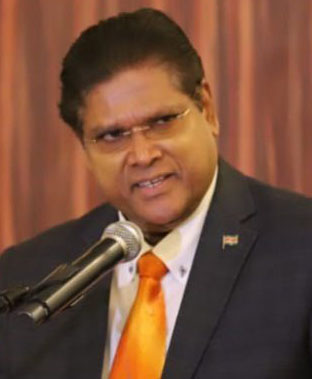Noting that the 2006 capture of Roger Khan in Suriname was the result of a well-coordinated plan, Chandrikapersad Santokhi, the neighbouring nation’s former Minister of Justice and Police, says he is not scared of the drug lord’s scheduled July release from prison.
“I believe that …in this period the government institutions and all the other institutions who have responsibilities to deal with threats, they will act properly,” Santokhi said on Saturday.
Santokhi, who is now the leader of Suriname’s Progressive Reform Party, attended the seventh fund-raising dinner for the Transparency Institute Guyana Inc (TIGI) last Saturday at the Pegasus Hotel with bodyguards. Two bodyguards were strategically placed in the Savannah Room of the hotel, where the event was being held and another was standing outside the room.
Santokhi, who delivered the feature address at the event, was asked during a question and answer segment following his presentation whether he had any fears of the release given that Khan reportedly made threats to his life.
While making it clear that he was only then made aware of Khan’s impending release, he said that following the capture there was information that there were some level of threats and the government institutions of Suriname as well as those internationally “had dealt properly with those threats.”
He expressed confidence that those institutions will be able to adequately address any new threats.
Santokhi also pointed out that back then he rolled out a very comprehensive programme to fight international organised crime, cross border crime, local crime, and illicit drugs. At the time of Khan’s arrest, Santokhi was the minister following a long career as Police Commissioner. He was elected Chair of the Inter-American Drug Abuse Control Commission (CICAD) in 2010.
He was specifically asked whether there was coordination between Guyana, Trinidad and Suriname with regards to capturing Khan.
The Suriname politican told the small gathering that based on that policy, there was a very serious comprehensive approach towards all kinds of crime and criminals. “In that period a lot of kingpins were arrested based on [a] national effort and also international coorperation.”
He said that in the case of Khan, his role then was to “take care of the implementation of the policy and he [Khan] was one of the first who [we] had to subject to that policy and on that comprehensive law enforcement programme.”
He had stressed that the regional and international justice systems had “done their job.”
Santokhi said also that international agencies, including those in the United States, had been looking for Khan. However, Guyana’s then Minister of Home Affairs Gail Teixeira formally indicated to Suriname that the government had “no interest” in seeking Khan’s return at that time. Then head of the Defence Board, Dr Roger Luncheon, had added that the Guyana government could find “no compelling evidence” for Khan to be investigated.
The then Bharrat Jagdeo-led administration, in fact, seemed more concerned about the manner of Khan’s arrest than his alleged crimes. Luncheon voiced the administration’s concerns by reiterating “its principled objection to the forceful and unlawful removal of its citizen across jurisdictions.”
Khan was held in Suriname on June 15th, 2006. Santokhi at the time deemed Khan a threat to national security and linked him to murder plots – the assassination of key government and judicial officials – in that country. By June 29th, 2006, Khan was expelled from Suriname and, on June 30th was arraigned before a US court on a charge of “conspiring to import cocaine into the US. The beginning of the end of Khan’s criminal career might have been the publication of the US Department of State’s International Narcotics Control Strategy Report for 2005, which was released in March, 2006. He was tried and sentenced to 15 years in prison.






